Dan Larhammar | |
|---|---|
| Born | April 1, 1956 |
| Nationality | Swedish |
| Education | Medical Science |
| Alma mater | Uppsala University Sweden |
| Occupation | Molecular biologist |
| Employer | Professor at Uppsala University Department of Neuroscience |
| Known for | Criticism of alternative medicine |
| Awards | Hedenius Award (2000), Pharmacist of the Year (2016), His Majesty the King's 12th size gold medal (2022), Order of the Rising Sun, Gold and Silver Star (2022) |
| Website | https://www.neuro.uu.se/research/research-groups/dan-larhammar/ |
Dan Larhammar (born April 1, 1956) is a Swedish academic professor in molecular cell biology at Uppsala University. His research concerns evolution, neurobiology, endocrinology and pharmacology. [1] As of 2021 Larhammar leads a research team at Uppsala that studies receptors for brain neurotransmitters and uses zebrafish as a model species to investigate the localization and functions of memory proteins. [2] Larhammar also serves as President of the Royal Swedish Academy of Sciences since 2018 and is a skepticism activist.
Larhammar received his pharmacist degree in 1980 and a PhD in medical science at Uppsala University in 1984. [3]
Since 1994 Larhammar has been a professor of molecular biology at Uppsala University where he has supervised 22 students to a PhD degree. [1] His research focuses on three lines of research: clarifying the evolution of the mechanisms for long-term memory, resolving the evolution important gene families in vertebrates, and investigating G protein-coupled receptors which make them bind to and respond to, or reject, certain ligands. Using zebrafish, Larhammar explores the localization and functions of the memory proteins. His team works on discovering at what point new functions rose and how they have changed over the course of evolution, especially in gene families that include neuropeptides, G-protein-coupled receptors, ion channels, and genes involved in vision.
In 2007, Larhammar was elected member of the Royal Swedish Academy of Sciences and serves as its president since 2018. He was the chairman of the Swedish Skeptics' Association 1998–2004. As a critic of pseudoscience, he has mostly examined alternative medicine and creationism.
Larhammar is a skeptic of pseudoscience, creationism and alternative medicine. In an issue of Skeptical Inquirer Larhammar addresses an article written by a creationist, Dmitrii A. Kuznetsov, attempting to disprove evolution by isolating mRNA from three species of voles. Each vole species was found to have a substance that blocked the production of protein from the other two species' mRNA production of protein, but did not block its own species' mRNA. The inhibiting substance however did not prevent protein synthesis of two distantly related mRNAs. Larhammar looked into the study and found that several sources and journals listed in the study did not exist. Larhammar also criticizes the lack of qualitative data of the experiments, relying only on quantitative results. [4] [ third-party source needed ]
In an interview with Linda Givetash, Larhammar criticizes the herbal remedies for COVID-19 pushed by China. Larhammar addresses studies from Chinese and Japanese journals that support herbal remedies do not have adequate sample sizes, use vague terms and nonpharmacological concepts, or to be testing too many combinations of herbs to parse out their specific effects. [5]
During another interview at the European Academics Science Advisory Council, Larhammar discusses the harm alternative medicine can have, especially during a pandemic. He states people may rely on non-working methods in lieu of seeking professional help with methods backed by evidence. Furthermore, these people will think they are protected, in turn causing them to take greater risks exposing themselves and others to the virus. This, Larhammar says, can lead those people into false beliefs that the disease is not as severe as it really is. [6]
Larhammar was during 2020-2021 the chairperson of a committee of experts appointed by ALLEA,the European Federation of Academies of Sciences and Humanities , that wrote a discussion paper with the title "Fact or Fake? Tackling Science Disinformation" [7] . The report summarizes research on the spread of disinformation, especially the psychology behind it. Focusing on disinformation on climate change, vaccines and covid-19, the report describe strategies to limit the harm, especially careful checking of facts and sources, and recommends coordination of efforts to achieve this.
Larhammar has also appeared as a critic of religion, and in 2000 he was the first receiver of the Hedenius Award given by the Swedish Humanist Association with the motivation that he has "with sharpness and pathos defended scientific knowledge, rationalism and humanism". [8]
Larhammar together with Prof. Leif Andersson Leif Andersson (animal geneticist) was awarded the Linnaeus Prize in Zoology 2004 by the Royal Physiographic Society in Lund.
In 2016 Larhammar received the Pharmacist of the Year award, given by Pharmacists of Sweden. The award is given to a pharmacist active in Sweden who, through his or her work within practical pharmacy, has contributed to strengthen, develop or consolidate the role of pharmacy within society. [9]
On January 28, 2022, Larhammar was awarded His Majesty the King's 12th size gold medal worn around the neck on the Order of the Seraphim ribbon "for meritorious contributions within the Swedish academic system." [10]
November 3, 2022 the Government of Japan announced the foreign recipients of the 2022 Autumn Conferment of Japanese Decoration. Larhammar was awarded The Order of the Rising Sun, Gold and Silver Star for his "contribution to the promotion of academic exchanges and mutual understanding between Japan and Sweden." [11]
Alternative medicine is any practice that aims to achieve the healing effects of medicine despite lacking biological plausibility, testability, repeatability or evidence of effectiveness. Unlike modern medicine, which employs the scientific method to test plausible therapies by way of responsible and ethical clinical trials, producing repeatable evidence of either effect or of no effect, alternative therapies reside outside of medical science and do not originate from using the scientific method, but instead rely on testimonials, anecdotes, religion, tradition, superstition, belief in supernatural "energies", pseudoscience, errors in reasoning, propaganda, fraud, or other unscientific sources. Frequently used terms for relevant practices are New Age medicine, pseudo-medicine, unorthodox medicine, holistic medicine, fringe medicine, and unconventional medicine, with little distinction from quackery.
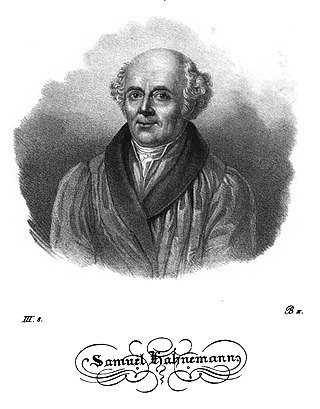
Homeopathy or homoeopathy is a pseudoscientific system of alternative medicine. It was conceived in 1796 by the German physician Samuel Hahnemann. Its practitioners, called homeopaths or homeopathic physicians, believe that a substance that causes symptoms of a disease in healthy people can cure similar symptoms in sick people; this doctrine is called similia similibus curentur, or "like cures like". Homeopathic preparations are termed remedies and are made using homeopathic dilution. In this process, the selected substance is repeatedly diluted until the final product is chemically indistinguishable from the diluent. Often not even a single molecule of the original substance can be expected to remain in the product. Between each dilution homeopaths may hit and/or shake the product, claiming this makes the diluent "remember" the original substance after its removal. Practitioners claim that such preparations, upon oral intake, can treat or cure disease.
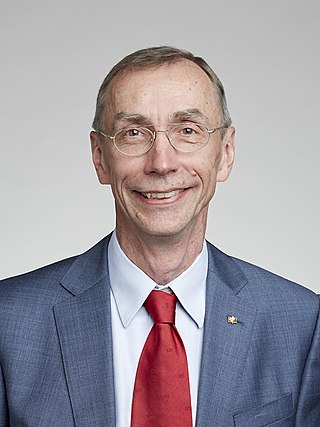
Svante Pääbo is a Swedish geneticist and Nobel Laureate who specialises in the field of evolutionary genetics. As one of the founders of paleogenetics, he has worked extensively on the Neanderthal genome. In 1997, he became founding director of the Department of Genetics at the Max Planck Institute for Evolutionary Anthropology in Leipzig, Germany. Since 1999, he has been an honorary professor at Leipzig University; he currently teaches molecular evolutionary biology at the university. He is also an adjunct professor at Okinawa Institute of Science and Technology, Japan.

Herbal medicine is the study of pharmacognosy and the use of medicinal plants, which are a basis of traditional medicine. With worldwide research into pharmacology, some herbal medicines have been translated into modern remedies, such as the anti-malarial group of drugs called artemisinin isolated from Artemisia annua, a herb that was known in Chinese medicine to treat fever. There is limited scientific evidence for the safety and efficacy of many plants used in 21st-century herbalism, which generally does not provide standards for purity or dosage. The scope of herbal medicine sometimes include fungal and bee products, as well as minerals, shells and certain animal parts.
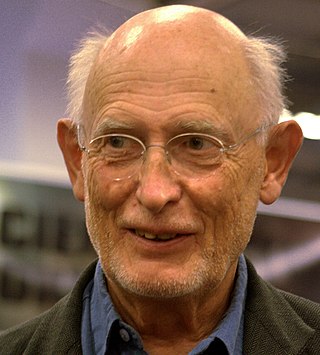
Per Christian Jersild, better known as P. C. Jersild, is a Swedish author and physician. He also holds an honorary doctorate from the Faculty of Medicine at Uppsala University from 22 January 2000, and another one in engineering from the Royal Institute of Technology (1999).

Linda Brown Buck is an American biologist best known for her work on the olfactory system. She was awarded the 2004 Nobel Prize in Physiology or Medicine, along with Richard Axel, for their work on olfactory receptors. She is currently on the faculty of the Fred Hutchinson Cancer Research Center in Seattle.

Anders Hallberg is a Swedish pharmaceutical researcher, professor in medicinal chemistry and 2006-2011 Rector Magnificus and Vice Chancellor at Uppsala University.

Edzard Ernst is a retired British-German academic physician and researcher specializing in the study of complementary and alternative medicine. He was Professor of Complementary Medicine at the University of Exeter, the world's first such academic position in complementary and alternative medicine.

Vetenskap och Folkbildning, abbreviated as VoF, is a Swedish skeptics' association. It was founded in 1982 with the purpose to raise the general public's awareness of scientific methods and results. The association publishes the quarterly journal Folkvett and organises lectures on themes related to science and pseudoscience. Since 1987 the association has annually awarded prizes for "Enlightener of the Year" and "Misleader of the Year".

Humanists Sweden is the largest humanist/rationalist organisation in Sweden with about 4,500 members. It is a member organisation of Humanists International (HI) and the European Humanist Federation (EHF).

Neuropeptide Y receptor type 1 is a protein that in humans is encoded by the NPY1R gene.

Opsin-5, also known as G-protein coupled receptor 136 or neuropsin is a protein that in humans is encoded by the OPN5 gene. Opsin-5 is a member of the opsin subfamily of the G protein-coupled receptors. It is a photoreceptor protein sensitive to ultraviolet (UV) light. The OPN5 gene was discovered in mouse and human genomes and its mRNA expression was also found in neural tissues. Neuropsin is bistable at 0 °C and activates a UV-sensitive, heterotrimeric G protein Gi-mediated pathway in mammalian and avian tissues.

Shizuo Akira is a professor at the Department of Host Defense, Osaka University, Japan. He has made ground-breaking discoveries in the field of immunology, most significantly in the area of innate host defense mechanisms.
Wayne A. Hendrickson is an American biophysicist and university professor at Columbia. Dr. Hendrickson is a university professor at Columbia University in the department of biochemistry and molecular biophysics and Violin Family Professor of Physiology and Cellular Biophysics. He is also Chief Life Scientist in the Photon Sciences Directorate at Brookhaven National Laboratory and scientific director of the New York Structural Biology Center. Hendrickson has a B.A. from the University of Wisconsin at River Falls, a Ph.D. in biophysics at Johns Hopkins University with Warner Love, and postdoctoral research experience with Jerome Karle at the Naval Research Laboratory (NRL). He and his colleagues use biochemistry and x-ray crystallography to study molecular properties in atomic detail with current emphasis on membrane receptors and cellular signaling, on viral proteins and HIV infection, on molecular chaperones and protein folding, and on structural genomics of membrane proteins. Hendrickson's advances in diffraction methodology have contributed significantly to the emergence of structural biology as a major force in modern biology and molecular medicine.
Björn Vennström is a Swedish molecular biologist. He received his Ph.D. in 1978 at Uppsala University with a thesis on RNA and in 1993, was appointed Professor of Developmental Biology at the Karolinska Institute. He is also a professor of molecular biology at the same institution. He was elected a member of the Royal Swedish Academy of Sciences, was awarded the Göran Gustafsson Prize in 1991, has served on the Nobel Committee for Physiology or Medicine from 2001 to 2006, and is the Chairman of the Nobel Assembly.

Alexander F. Schier is a Professor of Cell Biology and the Director of the Biozentrum University of Basel, Switzerland.

Katalin "Kati" Karikó is a Hungarian-American biochemist who specializes in ribonucleic acid (RNA)-mediated mechanisms, particularly in vitro-transcribed messenger RNA (mRNA) for protein replacement therapy. Karikó laid the scientific groundwork for mRNA vaccines, overcoming major obstacles and skepticism in the scientific community. Karikó received the Nobel Prize in Physiology or Medicine in 2023 for her work, along with American immunologist Drew Weissman.
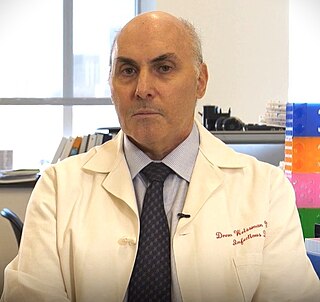
Drew Weissman is an American physician and immunologist known for his contributions to RNA biology. Weissman is the inaugural Roberts Family Professor in Vaccine Research, director of the Penn Institute for RNA Innovation, and professor of medicine at the Perelman School of Medicine at the University of Pennsylvania (Penn).
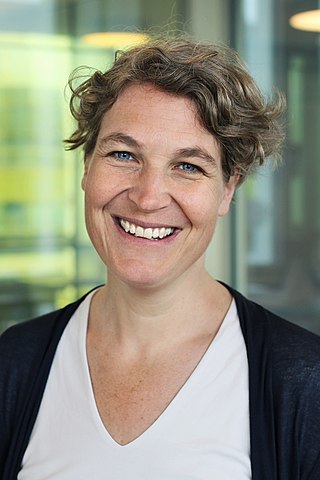
Andrea Pauli is a developmental biologist and biochemist studying how the egg transitions into an embryo, and more specifically the molecular mechanisms underlying vertebrate fertilisations, egg dormancy, and subsequent egg activation. Her lab uses zebrafish as the main model organism. Andrea Pauli is a group leader at the Research Institute of Molecular Pathology (IMP) at the Vienna Biocenter in Austria.